As a dog owner, you’re probably no stranger to the occasional scratch or sore on your beloved pet. But when these sores become more severe or persistent, you might wonder: “What to put on a dog sore?”
In this article, we’ll explore this topic in-depth, giving you the information you need to take good care of your canine buddy. We’ll cover everything from home remedies to when it’s time to seek vet advice, ensuring you’re well-prepared to deal with this typical dog issue.
Causes of Dog Sores
First, let’s start by understanding why your dog might develop sores in the first place. While these can be a result of a variety of factors, some of the most common causes include:
- Allergies
- Parasites
- Infections
- Skin trauma
- Autoimmune disorders
Getting to the root of any issues they may be experiencing is essential to keep your furry friend healthy and happy. Determining the underlying cause of a problem can provide effective treatment and prevent future occurrences. For example, if your pup is dealing with allergies, a change in diet or environment could work wonders.
Home Remedies for Dog Sores
Here are a few home remedies to help treat minor sores on your dog’s skin. Remember, these remedies are for minor skin issues only, and if your dog has deep, open, or painful sores, or if the sores do not improve within a few days, seek veterinary care immediately.
1. Aloe Vera Gel Treatment
Aloe vera is known for its healing and soothing properties.
- Step 1: Obtain pure aloe vera gel from a plant or purchase a 100% aloe vera gel bottle.
- Step 2: Clean the sore with warm water and gentle pet-friendly soap.
- Step 3: Pat the area dry with a clean towel.
- Step 4: Apply a small amount of aloe vera gel to the sore.
- Step 5: Let it air dry.
- Step 6: Prevent your dog from licking the area for a few minutes while the gel absorbs.
2. Coconut Oil Treatment
Coconut oil can serve as a moisturizer with antimicrobial properties that can help prevent infection.
- Step 1: Purchase a jar of organic, cold-pressed coconut oil.
- Step 2: Clean the affected area as described above.
- Step 3: Apply a small amount of coconut oil to your fingers.
- Step 4: Gently massage the coconut oil onto the sore.
- Step 5: Allow the oil to absorb into the skin.
3. Chamomile Tea Rinse
Chamomile has anti-inflammatory properties, which can soothe skin irritations.
- Step 1: Brew a strong cup of chamomile tea and allow it to cool.
- Step 2: After cleaning the sore, gently pour the cooled tea over the area or use a cloth soaked in the tea as a compress.
- Step 3: Allow the area to air dry.
- Step 4: Do not rinse it off; let the chamomile tea residue stay on the sore.
4. Apple Cider Vinegar and Water Mix
Apple cider vinegar can help balance the pH levels of your dog’s skin and has antimicrobial properties.
- Step 1: Mix equal parts of apple cider vinegar and water in a spray bottle.
- Step 2: Spray the mixture on the area after cleaning the sore. Make sure it doesn’t get into your dog’s eyes or nose.
- Step 3: Allow the area to air dry.
- Step 4: If your dog’s skin appears too sensitive to the vinegar (i.e. if it causes more redness or irritation), stop using this remedy.
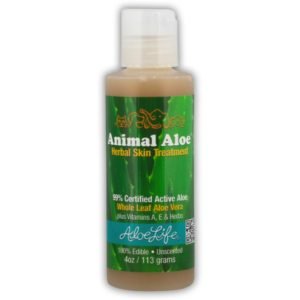
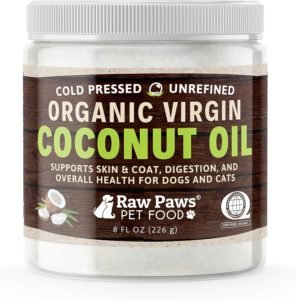
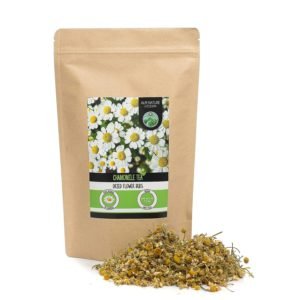

Signs of Infection in Dog Sores
While we strive to manage our pet’s wounds appropriately, there’s still a chance that the sore may become infected. It’s crucial to keep a close eye on the sore for the following signs of infection written by ASPCA :
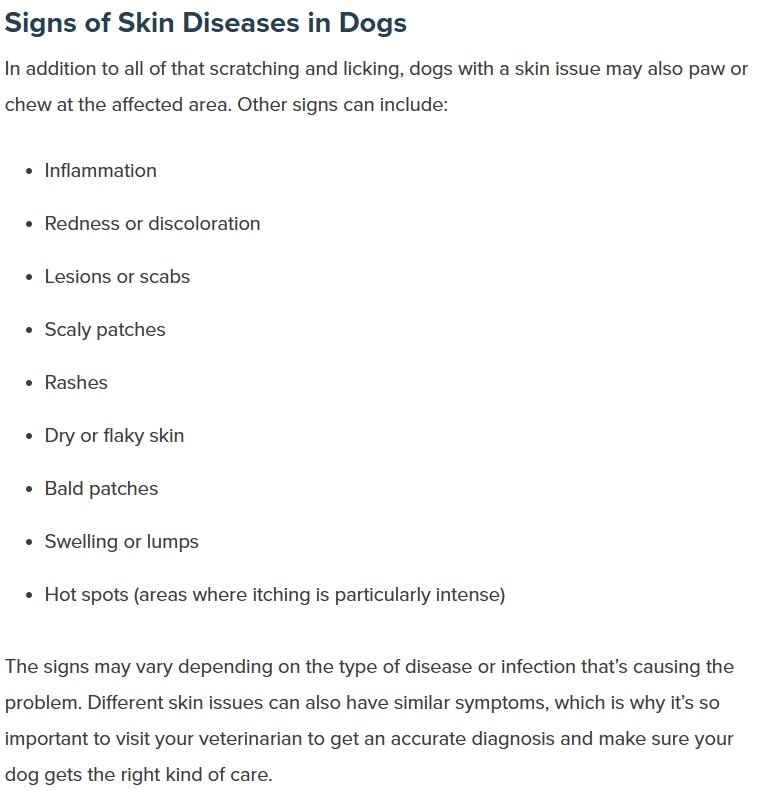
Top 8 Skin Diseases in Dogs
Fleas
Fleas are common pests that dogs can pick up from various environments or other dogs. While fleas can be a nuisance, their bites and droppings usually cause skin itching and irritation. Dogs can also have allergic reactions to flea saliva, exacerbating the issue. Several over-the-counter treatments are available, but it’s crucial to consult with a vet for sensitive dogs.
Ticks
Ticks, like fleas, are tiny parasites that can cause irritation and even transmit diseases like Lyme. If your dog spends a lot of time in tick-prone areas, it’s essential to inspect them thoroughly afterward. If ticks are found, they must be carefully removed to avoid leaving behind any pieces that could cause an infection.
Dry Skin
Various factors, including environmental conditions, allergies, dehydration, or dietary issues, can cause dry skin in dogs. Symptoms of dry skin include scaly or flaky skin and redness or inflammation from scratching. Ensuring your dog has a well-balanced diet and access to clean water can help alleviate these symptoms.
Manage
Manage is caused by tiny mites that dogs often carry on their skin and fur. When they reproduce excessively, these mites can cause infections, leading to Sarcoptic Mange (canine scabies) and Demodectic Mange. Symptoms include bald patches, inflammation, sores, and scabs. A vet can provide appropriate treatment, including special shampoos or oral medications.
Hot Spots
(Acute Moist Dermatitis)
Hot spots are red and inflamed skin areas that allergies, insect bites, infections, or excessive licking can cause. These spots often appear on a dog’s chest, hips, or head and can cause discomfort. Treating hot spots involves addressing the underlying issue, often requiring veterinary assistance.
Skin Infections
Skin infections like yeast infections, impetigo, and folliculitis can lead to various symptoms, including irritation, discoloration, bumps, sores, and scabs. These infections may need to be treated with medicated baths, ointments, or oral medications prescribed by a veterinarian.
Allergies
Dogs, like humans, can suffer from allergies to various substances, from shampoos and cleaning supplies to fleabites and certain foods. These allergies can result in a skin rash, which can cause itching and discomfort. Treatment will depend on identifying the cause of the allergy and could involve creams, medications, or simply avoiding the allergen.
Ringworm
Despite its name, ringworm is caused by fungus, not worms. This disease results in circular patches on the infected dog’s skin and possible scaly skin, bald patches, and inflammation. Puppies are often susceptible to ringworm, which can be transmitted between dogs in proximity, such as in shelters or kennels.
Spot a Health Condition an Expert Advice
At Animal Trust, they know their stuff when it comes to furry friends. According to this trusted source, dog skin conditions are a frequent reason for visits to their clinics. These pesky skin issues can be a pretty big pain in the paws, here is How to spot a pet with a skin condition:
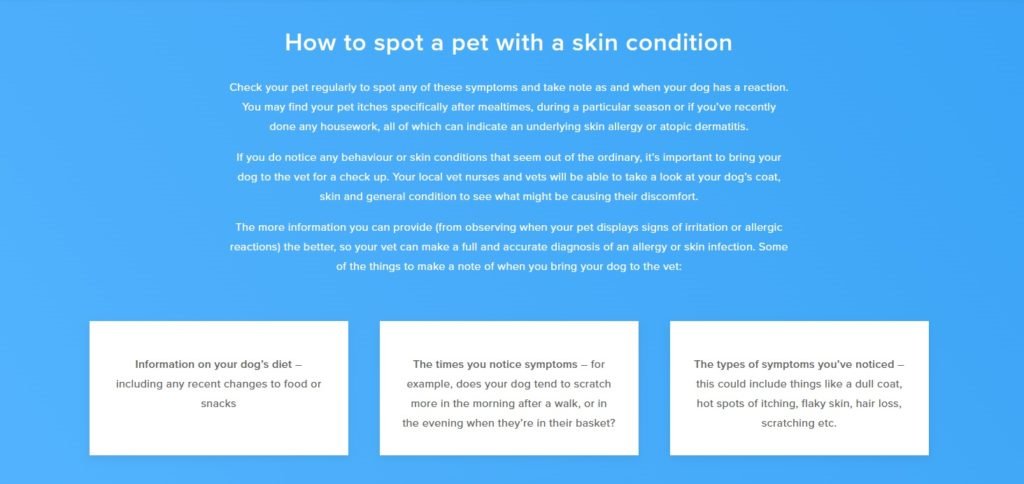
Take your Dog to the Vet??
Continuing with the expert advice on knowing when it’s time to take your furry friend to the vet for some relief. According to Jennifer Coates, DVM, a trusted veterinarian, there are some key signs to watch out for, as she outlines in her informative article.
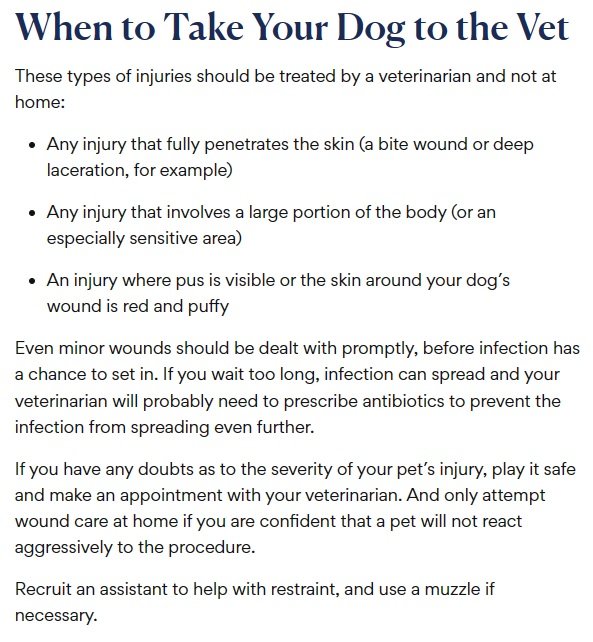
Dog Sore Prevention Tips
Preventing dog sores involves regular grooming and inspection of your pet’s skin:
- Groom Regularly: Brush your dog regularly to avoid matting and to detect any abnormalities early.
- Healthy Diet: Ensure your dog is on a balanced diet to maintain healthy skin and a potent immune system.
- Flea and Tick Control: Regular flea and tick prevention can help prevent skin irritations that can lead to sores.
- Regular Check-ups: Regular visits to the vet are a wise decision as they can help identify potential health concerns in their early stages, thwarting any possibility of them developing into serious problems.
How to Help a Dog with Sores
If your furry friend is going through a tough time with a sore, it’s important to lend a helping hand. One of the best things you can do is create a cozy area for them to rest and recuperate. Don’t forget to keep the space clean too! Additionally, keep an eye out for those pesky licks and scratches, as they can hinder the healing process and even lead to further complications.
Conclusion "What to Put on a Dog Sore?"
Figuring out what to put on a dog sore can seem daunting, but it’s manageable with the proper knowledge and resources. Remember, the best way to treat a sore is to prevent it from forming in the first place. By maintaining a healthy, clean environment for your dog and by keeping an eye on their skin health, you’ll be well-equipped to handle any skin sores that might come your way.
FAQ: "What to Put on a Dog Sore?"
1. Q: Can I use human ointments or creams on my dog’s sore?
A: It’s not recommended to use human ointments or creams on your dog’s sores without veterinary advice. Some ingredients can be harmful to dogs if ingested, which can easily happen if your dog licks the area.
2. Q: What home remedies can I use for my dog’s sore?
A: Some home remedies that can be used for minor sores include aloe vera gel, coconut oil, chamomile tea rinses, and apple cider vinegar mixed with water. However, it’s important to monitor the sore closely and seek veterinary care if it worsens or doesn’t improve.
3. Q: How can I prevent my dog from licking the sore?
A: You can use an Elizabethan collar (also known as a cone) to prevent your dog from licking the area. There are also special no-bite sprays available that deter dogs from licking due to their unpleasant taste.
4. Q: How often should I apply these treatments to my dog’s sore?
A: The frequency may depend on the specific treatment and the severity of the sore. As a general guideline, once or twice a day is a common recommendation. If the sore worsens or doesn’t improve within a few days, consult with a vet.
5. Q: When should I seek veterinary care for my dog’s sore?
A: You should seek veterinary care if the sore is deep, open, or painful, if it is accompanied by other symptoms like lethargy or loss of appetite, if it’s not improving within a few days, or if it’s getting worse despite home treatment.
6. Q: Can dog sores become infected?
A: Yes, dog sores can become infected if they are not properly cared for. If you notice signs of infection, such as pus, increased redness, swelling, or a bad odor, take your dog to the vet immediately.
7. Q: Can I use over-the-counter pet ointments on my dog’s sore?
A: Yes, but it’s always best to consult with a vet before starting any new treatments, even over-the-counter ones. The vet can guide you on the best course of action based on the type and severity of your dog’s sore.
Recommended Articles

Mastering the Art of Dog Training: How to Train Your Dog to Stop Barking
Introduction to Dog Barking Barking

How to Clean Goldendoodle Ears: Preventing Infections
Welcome to our essential guide

Top Picks: Best Harness for Goldendoodle Revealed!
Welcome to our comprehensive guide

Insider Tips for the Perfect Goldendoodle Diet
Struggling with your Goldendoodle’s diet

Goldendoodles Grooming: The Ultimate Toolkit for Perfect Care
Table of Contents Welcome to
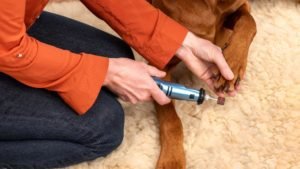
Discover the Perfect Dog Nail Grinder for Your Furry Friend
Finding the ideal dog nail grinder can

